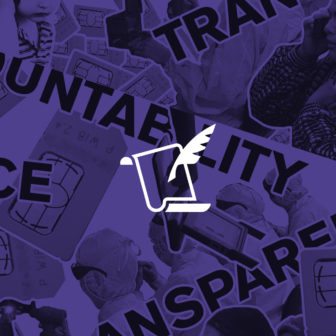Tag: Regulation

Updated Human Rights Principles clarify acceptable scope of government surveillance authority
Access and other groups introduce updates to International Principles one year after their introduction.

TTIP negotiations: transparently opaque
On July 14th, the European Union and the United States kicked off the sixth round of negotiations of what could be the world’s largest trade pact — the Transatlantic Trade and Investment Partnership (TTIP). The negotiations, which have been taking place for more than a year, are about opening markets on both sides of the Atlantic for exchange in goods, services, investment, and public procurement.

Access tells the FCC to use its authority to reclassify broadband and protect net neutrality
This week Access submitted comments to the FCC urging it to use its full authority to reclassify broadband internet access service as a telecommunications service under Title II of the Telecommunications Act — the only viable way the agency can safeguard the values that enabled the internet to become a global force for commerce, culture, free expression, and innovation.

World’s top human rights authority slams global surveillance practices in new report
In a scathing new report, the UN High Commissioner for Human Rights warns that mass surveillance is “emerging as a dangerous habit rather than an exceptional measure” and that “the very existence of a mass surveillance programme…creates an interference with privacy.” The commissioner also slams judicial review processes, writing that in many countries they “amounted…to an exercise in rubber-stamping.”

Access calls for President Obama to pledge to veto CISA
Access and a coalition of digital rights groups, companies, and security experts submitted a letter to U.S. President Obama urging him to pledge to veto the Cybersecurity Information Sharing Act (CISA), and any other bill that includes similar provisions that would hurt our basic right to privacy.

Three things you should know about the Google Spain case
On May 13th, the European Court of Justice ruled on the case between the Spanish citizen, Mario Costeja González and Google Spain, regarding the Spanish Data Protection Authority requests for the search engine to withdraw personal data relating to Mr Costeja González from its index and to prevent access to the data in the future.

Mexico passes new online surveillance law
Despite vocal and active campaigns by internet users in Mexico and around the world, the Mexican Congress approved a dangerous telecoms bill that increases surveillance and data retention while sanctioning mobile network shutdowns.
School house lock: How the U.S. government proposes to “protect” your data
CISA and CISPA propose information sharing to thwart cybersecurity threats, but instead increases surveillance and harm whistleblowers.
U.S. Supreme Court acknowledges cell phone privacy concerns
Yesterday, the Supreme Court announced its decision in two cases, Riley v. California and U.S. v. Wurie, holding, “a warrant is generally required before a search” of information on a cell phone can occur. The ruling embraces the substantial privacy concerns inherent in the search of a modern mobile phone, which is often equivalent, as the Court says, to a mini-computer. This decision will likely further be seen as an important precedent when it comes to searches of other electronic devices like laptops or tablets.
Online crackdown continues: Thai junta sets up five panels to monitor media
Thai junta plans to establish a new government working groups to monitor media, on and offline.